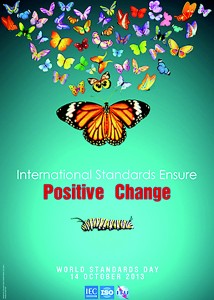Sunday Times 2
Standards ensure positive change: Whither implementation
Each year on October 14, the World Standards Cooperation celebrates World Standards Day as a means of paying tribute to the collaborative efforts of the thousands of experts worldwide who develop international standards.
In doing so in a more fruitful manner, the WSC identifies each year a theme and runs a competition, to find the poster to provide the visual identity.
The 2013 competition asked for a poster illustrating the theme: International standards ensure positive change. The winner came from Germany. The first runner-up is the two-member Sri Lanka team comprising Seuwandi Yapa and Samith Roshan.
Time-tested benefits of standardisation
A standard is a document that provides specifications, requirements, guidelines or characteristics that can be used consistently to ensure that materials, processes, products and services fit optimally for their purpose.
When implemented rightly standards ensure that built environments, facilities and services become more accessible and user friendly even to persons with restricted abilities.
They enhance the satisfaction and delight of a wide range of end-users and make a significant positive contribution to the quality and safety of everyone’s life.
Standards are also becoming increasingly important in helping cities develop more intelligent and sustainable infrastructures, making them and the world we live in better.
Implementing standards is low-cost investment providing solutions and bringing social integration and other rich dividends in almost all sectors of activity – including construction and environment.
Standards even provide business, government and society with practical tools for all three dimensions of sustainable development: economic, environmental and social.
Why International Standards?
International standards represent the consensus view of the world’s leading experts volunteering their knowledge in service of the public interest.
International standards provide cohesion to a myriad of differing national and regional standards. They harmonise technical specifications, provide interoperability, avoid technical barriers, help optimise operations and increase competitive advantage and thereby improve the bottom line.
These benefits are ultimately all passed on to the consumer in the form of greater choice, increased quality and lower prices and thereby build global prosperity.
The World Trade Organisation thus focuses to connect the world with international standards and requires all its members to use and implement international standards developed and published by ISO – the International Organisation for Standardisation.
The organisations’ or businesses’ relationship to the people, society and environment in which they operate is a crucial factor concerning their ability to continue to operate effectively. ISO 26000 provides guidance how organisations can and should operate in an ethical and socially responsible manner that contributes to the welfare of society. It is also widely being used as a measure of their overall performance.
Accessibility is increasingly an issue as the world population ages and increasing number of people with restricted abilities demand equal access to social, political and economic life.
For them access to information, technology and communication is as important as is the ability to use an elevator, enter a building, use safely with ease a toilet, travel, or easily turn on and use a device, regardless of the degree of their ability.
Accessibility is not only an issue for the elderly or dis-abled as anybody at any stage in life can experience temporarily reduced ability but simple everyday essential activities should then not become a daunting task to accomplish.

Crusader on wheels - Dr Ajith C. S. Perera
International standards include considerations for diversity in human ability geared to make the world safer and more user-friendly for all, today and tomorrow.
Thereby they give builders, designers, owners and service providers the guidelines on how to design parts of buildings accessible and facilitating everybody’s access and use with safety.
They also help incorporation of new technologies for the construction and operation of intelligent and sustainable buildings.
Towards continual improvement
The Government’s policy, as the vision 2010 page 192 states, aims to mobilise persons with restricted ability, empower and integrate them into society as useful and equal partners.
The Supreme Court once again on June 17, 2013 has given comprehensive directions to ensure that those with restricted ability be given every opportunity to integrate freely with the community.
Arresting the waste of human potential in mobilising this asset and minimising unwanted dependency are prerequisites to achieve a formidable and sustainable national economy.
Plans are in place to make Sri Lanka the centre of excellence in tourism management and development in the region. For this to happen, facilities complying with international standards established rightly at hotels and resorts — especially toilets and bathing — are indispensable.
A malady of national importance
However, the way we continue to design and construct or even renovate state and private sector buildings the public needs to access and use in normal life, disregards compliance with standards and thereby is DIS-ABLING.
Dis-Abling buildings bring considerable disadvantages to an estimated 25 per cent of our population, cause waste of resources, thwart national development, aggravate social and economic issues and thereby plague the country in untold proportions.
Root causes for this malady are many.

The poster by Sri Lankan duo Seuwandi Yapa and Samith Roshan won the first runner-up prize at the World Competition run by the World Standards body in Geneva
Professionals in the building construction industry fail to recognise the inevitable diversity in human ability — the fact that every one of us suffers a process of decay and also can meet with an accident or a debilitating medical condition which restricts our ability to attend to normal daily activities, at any time of life without any warning.
International Standards provide space requirements and design guidelines for all key parts of a public building, including steps, stairs and hand rails, doorways, toilets and wash facilities.
Our initiative paved the way in 2006 for the establishment of the first Sri Lankan standard in building construction — SLS ISO TR 9527:2006 — identical with the international standard published in 1994 by the ISO. BUT awareness to it remains poor
Accessibility Regulations, No. 1 of 2006 made under Protection of the Rights of Persons with Disabilities ACT, No: 28 of 1996 incorporating these Standards have been gazetted on October 17, 2006 and on March 20, 2007; they were approved unanimously by all Members of the Parliament.
Orders given twice by the Supreme Court on April 27, 2011 and June 17, 2013 state: Compliance by authorities empowered to approve plans and issue certificate of conformity as well as owners and heads of establishments occupying such premises is mandatory and failure to comply is a serious punishable offence.
Yet…, even after eight years, Sri Lanka has failed to establish an overall mechanism for the effective enforcement and implementation of these laws and even orders by the apex court causing a debacle of national importance.
As a result, violators go free; the victims are left stranded, they must either earn the goodwill of the violators or suffer further.
Ensure positive change
To optimise the results of development programmes reaching everyone, facilities at buildings must be designed for full participation of the public in all daily activities, regardless of degrees of ability.
There are several low cost measures that can significantly improve compliance with standards. Loss of non-compliance is colossal, compared to the money needed.
However, it is a responsible task that requires specific practical experience backed by several other essential skills. Even many reputed professionals here sadly lack this vital competence only to waste resources and create safety hazards — a costly blunder no organisation can afford!
comments powered by Disqus

